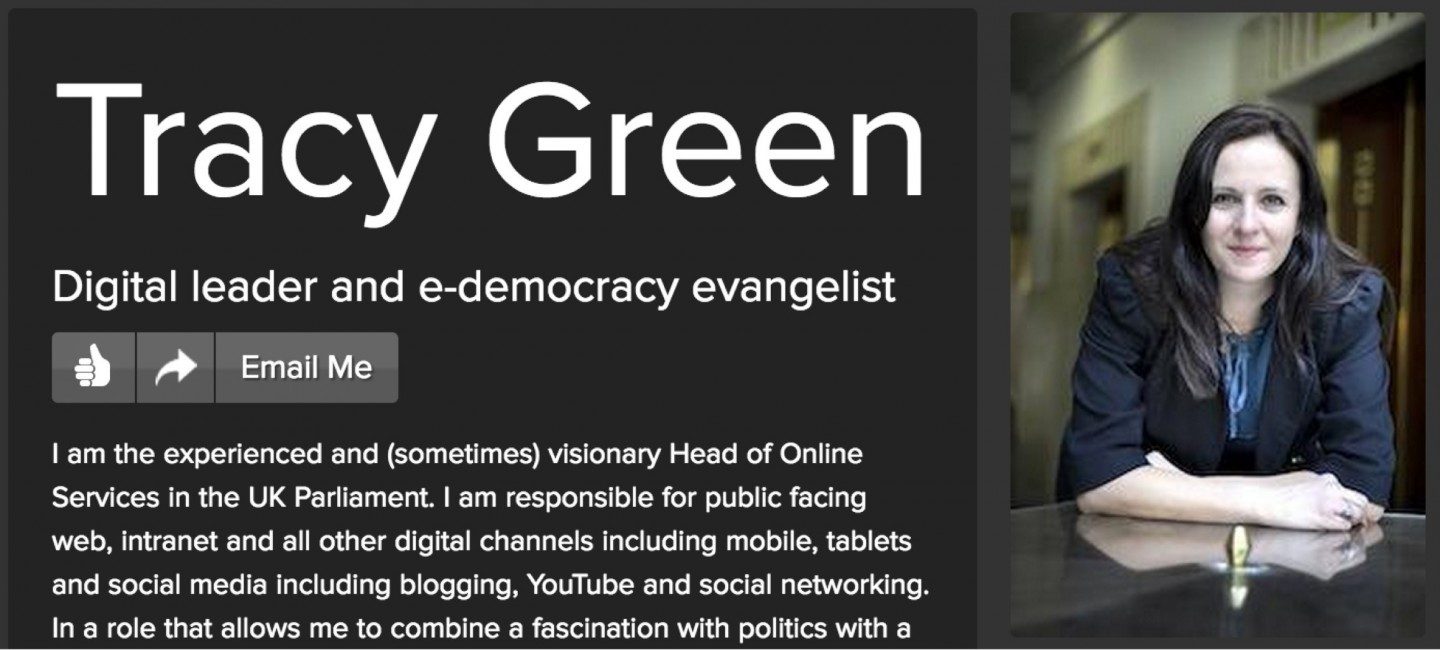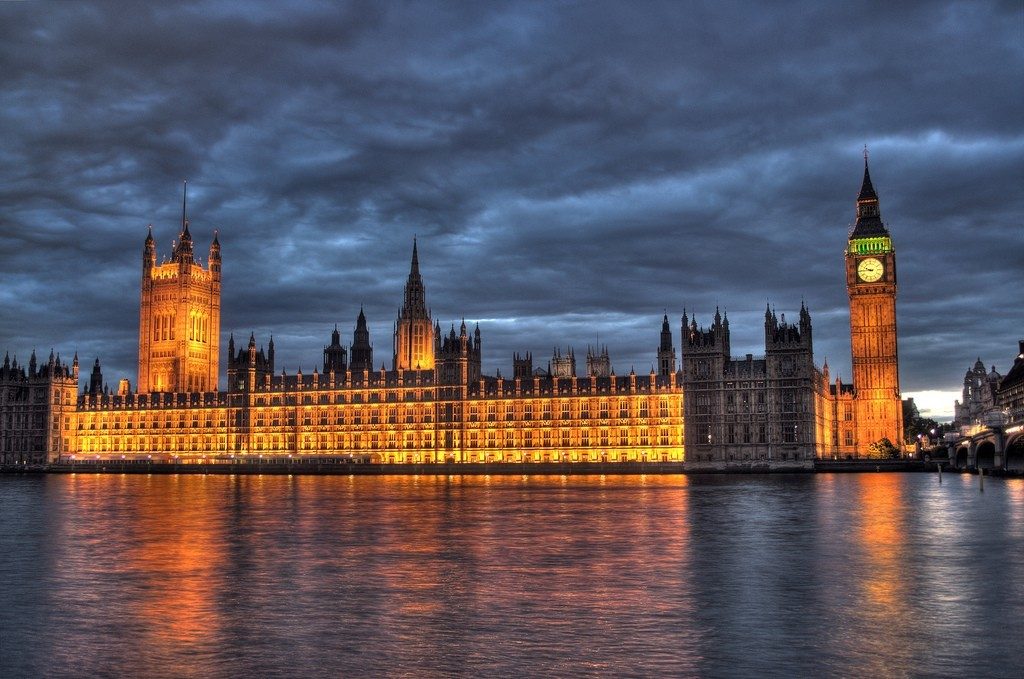Nu börjar jag värma upp inför Digital Knowledge Day 2013. Förutom att luta mig tillbaka och njuta av programmet så har jag fått förmånen att ha ett samtal på scenen med Tracy Green – konferensens huvudtalare. Jag delar helt hennes passion för e-democracy, öppenhet och hur vi ska se till att det här med internet blir så bra som möjligt för hela vårt samhälle.
Det kommer att bli ett grymt samtal och jag ser gärna att du är med och ställer frågor. Men otålig som jag är har vi redan ställt sex frågor till henne, som föda för tanken, som inspiration, som en liten försmak på hur grym hon är. Klura, och ställ sedan din fråga – öppet eller via mail till [email protected].
Den som ställer den bästa frågan (jag bestämmer;) i kommentarsbåset nedan, eller på twitter, kommer också att få gå på #DKD13 helt utan kostnad, som min gäst under hela dagen.
Sedan hoppas jag att vi ses på Hotel Rival i Stockholm den 10 april. Har du inte redan bokat så gör det nu, och använd min kod – Jocke-DKD – som ger dig 1000 SEK rabatt (men inte ett öre till mig;).

You are the Head of Online Services at the UK Parliament, what is your biggest challenge in that role?
There are a number of big challenges including how we make our content available on mobile devices, how we ensure people can find what they are looking for within such a huge amount of information, but I think the main challenge is really all about explaining what Parliament does to as many people as possible so that they know how they can engage with our democratic process. Many people continue to confuse Parliament with Government so it’s our job to explain and demonstrate the role Parliament has in scrutinising and debating what Government does, making the laws that govern our country. People are disillusioned with party politics and politicians to a large extent and so we need to engage them in the work of Parliament, demonstrate why Parliament is relevant to them and give them opportunities to get involved. We have lots of tools and channels to do this from the website to social media and we need to make these channels accessible, easy to use and reach as many people as possible.
Swedes think of themselves as a very “digital” nation with a high broadband penetration and high level of Internet experience. What is your view of Swedes in this perspective?
My own personal view is that Scandanavia as a whole is the home of a lot of digital innovation, pushing the boundaries online. A really good example of this is the open data initiative. The Swedish Parliament have opened up their data to the public, over 200,000 documents, making all of that data freely available to the public. They are also encouraging communities to use that data to create their own applications and services for the greater benefit of society. This is something the government of the UK are doing on data.gov.uk and something we in the UK Parliament are working hard to be able to achieve. The Swedish Parliament are a great example to others.
What is the big differences you see between the UK Parliament and the Swedish government in the use of social media?
It’s probably more appropriate for me to comment on what the Riksdag are doing as that is more closely aligned to Parliament. The UK Parliament started about five years ago to experiment with social media as a channel for engaging with citizens. We launched a Twitter feed, A FaceBook page, a YouTube channel and a Flickr page. We used these channels to promote the work of parliament and to share our content with a much wider audience. Twitter in particular has been a really successful channels for us and we now have over 128,000 followers. We use this channel in particular to promote publications and events going on in both Houses and add links to bring traffic back to our website. I can see that in this area we are perhaps a little ahead of the Swedish parliament who I know have only just launched a Twitter feed in the last couple of months. I’m sure they had to overcome a lot of scepticism as we did about the value of this channel of communication but the good fortune we had was to be able to launch these channels very quietly in an experimental way and they have grown hugely over time. This means that by the time senior decision makers become aware of them they are already a success. We were also lucky that at the time of us launching these channels there was not so much negative coverage.
For a larger organisation to address the digital change, what is the three most important pit falls to avoid?
I’d say the three main pitfalls to avoid are:
- Don’t plan on a three or a five year basis. The digital landscape is changing so quickly that by the time you have written a five year digital strategy, something new has arrived.
- The digital change is about organisational and culture change, not technology, technology merely enables that change. One of the main priorities for the UK Parliament over the next year is to train and up-skill the organisation to use digital channels more effectively. This includes areas like writing for the web, optimising content for search and using social media
- Look to new models of delivery rather than old ones. Delivering a project in the past was all about a waterfall approach: scoping the project, gathering requirements and delivering with a big bang. The age of the website redesign is over and the focus is now all abut agile development and iterative enhancements. We use an agile development approach and get the wider organisation involved as much as possible so that it’s not just technologists delivering the outcome. We also use Kanban and have a methodology of continuous improvement.
The fact that social media is an open channel where everyone can see what others are writing, still scare some companys/organizations from opening up a Facebook Page or a Twitter account. What would be your first advice to these companys/organizations?
I’d say that open dialogue and transparent conversation is the new normal, those who are not part of it but sit outside are not minimising risk but taking a bigger risk. Of course you have to have clear guidelines about how as an organisation you want to engage in that dialogue and use channels like Twitter and FaceBook but without making sure you have a presence there you are missing an opportunity. The drive is now to go where the people are. YouTube is the second biggest search engine on the internet and FaceBook has more than 800 million active users, it makes sense, if done in the right way, to use those spaces to engage with people.
Looking in to the future, please give some brief examples of what trends you see that will impact digital marketing the most?
For me the biggest trends are around mobile and data. For mobile, it will not be belong before more people are accessing the internet via a mobile device than via a PC. Many big companies and organisations are already investing to ensure that they have a mobile first strategy and so developing responsive websites and applications that work across a range of platforms will be really important for reaching as many people as possible. In terms of data, there is now a huge drive in this area. The potential value of data is considered to be billions of euros and we need to release the data so that it can realise it’s full potential.
Bildcred: The British Parliament and Big Ben cc licensed ( BY ) flickr photo shared by ** Maurice **


Jag tycker mig se två tydliga trender när det gäller anonymitet: en som rör sig mot riktiga identiteter, utan anonymitet (Facebook, Google-sfären) och en mot anonymitet (Twitter, Reddit). Bägge har för- och nackdelar. Moot på 4Chan pratar vettigt om fördelarna med anonymitet. Å andra sidan finns många exempel på när anonymitetsförbud höjt kvaliteten på deltagandet. Om dessa två skulle ställas mot varandra, vilket skulle hon välja, och hur resonerar hon kring det?
Bra fråga! Kanske med följdfrågan – Kan man tänka sig att ett internet utan anonymitet blir en tydligare förlängning av “verkligheten” men att man då tappar sådant som blivit möjligt först med internetkulturen?
Åh, tack! Det var precis i den banan jag tänkte, men jag skrev inte ut det. Jag ser att “digitalt” kan bli en tydligare förlängning av det vi redan har med det spåret, samtidigt som man förlorar en annan del. Jag är själv osäker var jag står i den här frågan, jag simmar mest omkring i den stora gråa zonen däremellan. Kanske lite mer åt “riktiga identiteter”, men så fort jag kommer för långt dit så skickar problemen tillbaka mig mot mitten.
Min fråga “Making it it easier for the public to find out about and engage with a public institution can be seen as two different things. Engaging citizens, not only as part of electing politicians but also practicing politics, means bridging information and communication. What are your thoughts on if, and how this aligning can/could be part of your work?”
Ett par förslag:
– What is your vision for bringing social media further into the democratic process? You state that Twitter for example is used to promote events and publications but what is your aim in terms of using Twitter and other media as a tool within the process rather than speaking about the process?
– How closely do you monitor the demographics of social media users? And does your strategy for using these shiny tools adress issues concerning possible exclusion? How is this integrated in your policies and strategies for communication?
Kanske borde skrivit på svenska som Micke men nu blev det så här. Säg till om nåt är otydligt.
Skulle vara intressant att höra något om hur man som statlig institution jobbar med att hålla ihop relationen över sociala medier från det lokala till det nationella, och kanske i vissa fall det globala perspektivet?
From your perspective. What will social media mean for politics and democracy in the long run?
Det är fantastiskt vilket enormt stort arbete man lägger ner på att göra sig tillgängliga för medborgarna. Mycket genomtänkt, mycket öppenhet, strategiskt, taktiskt. En viktig sak som jag skulle vilja veta är hur man tänker kring att allt även ska kunna kommas åt av alla. Jag tänker mig att det fortfarande idag finns stora grupper som saknar internetkoppling och / eller terminal och då kan man ha hur mycket material som helst tillgängligt online. Riktig demokratiskt blir det inte förrän alla har samma möjlighet att faktiskt kan komma åt och använda materialet. hur tänker man kring detta?